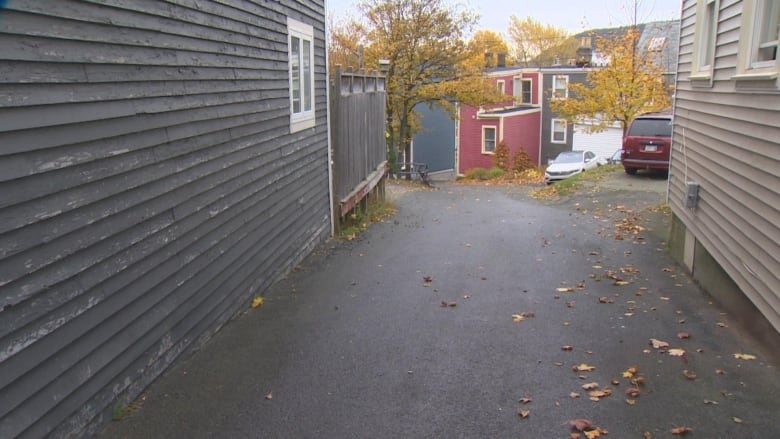Bond Street tensions had police and neighbours preparing to meet. Then a violent death happened
Chief Joe Boland says frequent shelter visits put pressure on resources

Kelly Hickey heard the sirens, saw the police dogs, and knew it wasn't a routine visit from police on Bond Street.
She felt helpless in her own neighbourhood.
"It was disempowering. It was scary. And now I just want to help so that we don't have to go through things like that again. A family lost a young man, and it didn't have to happen."
Police Chief Joe Boland had a similar reaction.
"It's almost like it's in your stomach when you hear it," he said. "Then you think about, why did this happen?"
Hickey and Boland were supposed to meet to speak about a rise in violence on Bond Street in downtown St. John's.

Before that could happen, the worst-case scenario did.
A 23-year-old man died after a bloody incident Tuesday night that occurred outside an emergency shelter house.
Hickey has been concerned about the growing number of fights, threats and assaults around the house for the past two years. She gathered a group of nearby residents, like an informal community group, who were in the process of setting up a meeting with Boland and ward councillor Hope Jamieson when the death occurred.
"It's heartbreaking to witness in the kind of slow build we've seen," Hickey said.
Don't blame the clients, Hickey says
CBC News spoke with the manager of the shelter on Wednesday, who said it was an unfortunate coincidence that the man was left bloodied right outside the front door.
He said there was a group hanging around the alley next to the shelter. The provincial government has confirmed the deceased was not a client of Newfoundland and Labrador Housing, meaning he wasn't a client of the emergency shelter.
But local residents say it's been the location of several fights and assaults, and that it's a common place for police visitations.
It just seems really silly to take a very high-risk, vulnerable population like we have here and then put them in a concentrated house with no resources.- Kelly Hickey
The manager said they always cooperate with police, and have turned over security camera footage to the Royal Newfoundland Constabulary.
Hickey said the residents don't lay blame on the clients inside the shelter. Instead, they are worried those people aren't getting enough help.
The shelter is privately run, and operates on a for-profit basis. It's one of several the government uses when a person has been turned away from non-profit shelters and has nowhere else to go.
These shelters are considered the bottom rung of housing services, because they do not offer anything aside from meals and a bed. Despite them being a last-ditch option for government, it's become a more prevalent option in recent years.

The shelter on Bond Street frequently charges government between $120 and $140 a night, while others have charged as much as $350 a night.
"It just seems really silly to take a very high-risk, vulnerable population like we have here and then put them in a concentrated house with no resources and no support, and expect them to thrive," Hickey said. "It just doesn't make sense. It's irresponsible."
After two years of incidents, she invited neighbours to gather in her kitchen. Ten people showed up and they discussed the problems they had with the house.
"There wasn't a single person around that table that said we need to get those people out of here," she said. "We were just discussing how do we get help for people in that house. Because it was very obvious people in that house needed help."
Strain on police resources
Police visits to emergency shelters and boarding houses around St. John's are a common occurrence.
This is a community issue and it's going to take a collaborative approach and it's going to be on all of us.- Chief Joe Boland
Boland said it soaks up a large amount of police resources, responding to situations where there are a number of compounding issues at play.
"They do put pressure on us," he said. "The number of calls that we get annually to shelters are significant and the issues that we have to deal with are significant. They're complex."
"In many cases you're dealing with homelessness, in some cases you're dealing with mental health, in other cases you're dealing with addictions," said Boland. "There's not easy solutions to some of the problems that are being faced by that particular part of our population."

Hickey says part of the solution is to find and fund better ways of housing these clients with services such as social workers and addictions counsellors.
She said it's time for members of the public to tell their representatives they want to see a change.
"We just really care, and we really want to help," she said of their group of residents. "Part of how we can help is to not just accept that we can't do anything."
Boland shared a similar sentiment, saying the fix to complex problems around homelessness, addiction and mental illness will take input and effort from everybody involved.
"This is a community issue and it's going to take a collaborative approach and it's going to be on all of us, even the media for that matter. This is our community."

